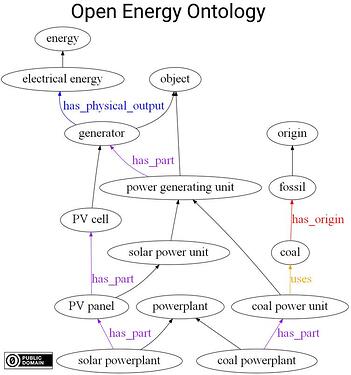OEO – Open Energy Ontology
The first major version (1.0.0) of the OEO has been released. I will try to collect and link important milestones here. Feel free to edit and add. Discussion on the ontology itself should be undertaken on GitHub.
The OEO is licensed using the CC0‑1.0 public domain dedication from Creative Commons.
openmod workshops
Links
Outreach
Related tags
1 Like
Hi @ludwig.huelk
Sounds interesting and - based on a brief glimpse - relevant and important.
Looking at the OEO website I couldn’t not answer the following questions for myself. Can you help:
- How do I know if this is relevant for me?
- When should I use and apply this?
- If I should use and apply this: At which stage of a project?
- How do I apply this.
- How do I get started?
I haven’t had any formal training on ontologies. Not sure about others.
Can you recommend and link a foundation laying resource?
Highly apprciated!
Best, Johannes
1 Like
Useful and well written summary of the OEO here (noting that this is a preprint and currently under review):
- Emele, Lukas, Hannah Förster, Johannes Frey, Ulrich Frey, Martin Glauer, Janna Hastings, Christian Hofmann, Carsten Hoyer-Klick, Ludwig Hülk, Anna Kleinau, Patrick Kuckertz, Till Mossakowski, Fabian Neuhaus, Martin Robinius, and Mirjam Stappel (15 June 2020). “The Open Energy Ontology — Preprint”. Full copyright.
Here is a newer version of the same paper:
- Glauer, Martin, Meisam Booshehri, Lukas Emele, Simon Fluegel, Hannah Förster, Johannes Frey, Ulrich Frey, Janna Hastings, Christian Hofmann, Carsten Hoyer-Klick, Ludwig Hülk, Anna Kleinau, Kevin Knosala, Leander Kotzur, Patrick Kuckertz, Till Mossakowski, Fabian Neuhaus, Martin Robinius, Mirjam Stappel, and Detlef Stolten (December 2020). “The Open Energy Ontology — Preprint”. Full copyright.
1 Like
Listing two videos released in late‑2020:
1 Like
Simplified schematic from the RLI press release of 11 June 2020:
Black lines denote an “is_a” relationship.
1 Like
Recent publication related to wind energy:
The preprint has been deleted since the submission was rejected.
A new paper has been published this week:
Meisam Booshehri, Lukas Emele, Simon Flügel, Hannah Förster, Johannes Frey, Ulrich Frey, Martin Glauer, Janna Hastings, Christian Hofmann, Carsten Hoyer-Klick, Ludwig Hülk, Anna Kleinau, Kevin Knosala, Leander Kotzur, Patrick Kuckertz, Till Mossakowski, Christoph Muschner, Fabian Neuhaus, Michaja Pehl, Martin Robinius, Vera Sehn, Mirjam Stappel,
Introducing the Open Energy Ontology: Enhancing Data Interpretation and Interfacing in Energy Systems Analysis,
Energy and AI,
2021,
100074,
ISSN 2666-5468,
https://doi.org/10.1016/j.egyai.2021.100074.
(https://www.sciencedirect.com/science/article/pii/S2666546821000288)
Abstract: Heterogeneous data, different definitions and incompatible models are a huge problem in many domains, with no exception for the field of energy systems analysis. Hence, it is hard to re-use results, compare model results or couple models at all. Ontologies provide a precisely defined vocabulary to build a common and shared conceptualisation of the energy domain. Here, we present the Open Energy Ontology (OEO) developed for the domain of energy systems analysis. Using the OEO provides several benefits for the community. First, it enables consistent annotation of large amounts of data from various research projects. One example is the Open Energy Platform (OEP). Adding such annotations makes data semantically searchable, exchangeable, re-usable and interoperable. Second, computational model coupling becomes much easier. The advantages of using an ontology such as the OEO are demonstrated with three use cases: data representation, data annotation and interface homogenisation. We also describe how the ontology can be used for linked open data (LOD).
Keywords: Collaborative ontology development; Linked open data; Metadata annotation; Energy systems analysis
2 Likes
